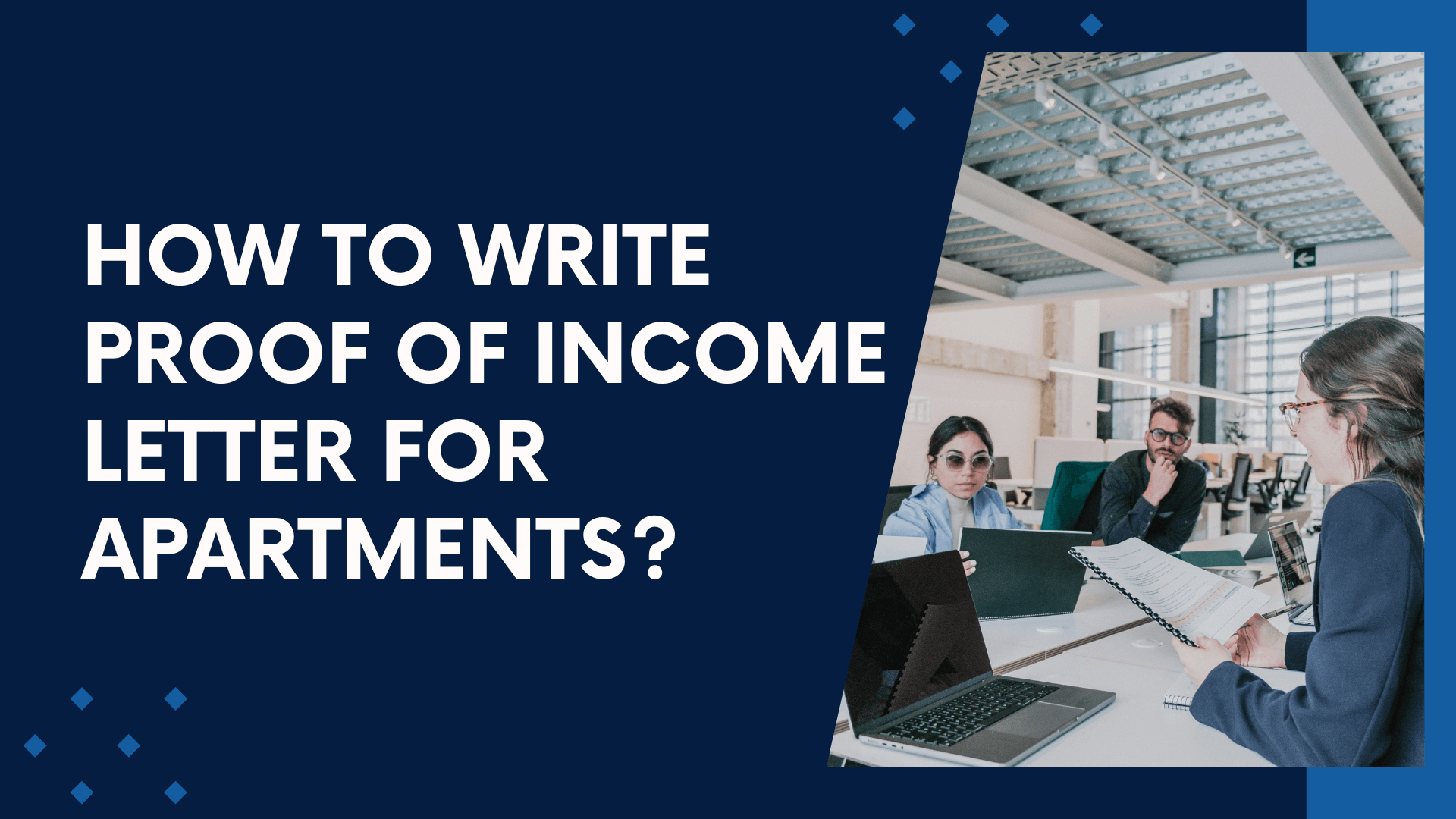Renting an apartment is an exciting step, but one of the most crucial parts of the application process is proving you can afford the rent. For many landlords, a Proof of Income Letter is a requirement to confirm that you’re financially stable enough to be a reliable tenant.
If you’re unsure where to start or how to put this letter together, don’t worry. This complete guide will walk you through everything you need to know – from understanding what a proof of income letter is to creating a professional, convincing document.
Quick Summary
A Proof of Income Letter is an official document that verifies your financial ability to pay rent. It’s often required when applying for an apartment and can be paired with some support documentation like pay stubs, bank statements, or tax returns.
This guide explains when and why proof of income letters are needed, the key components to include, and tips for avoiding common mistakes. Sample templates are provided for easy use, and we’ll cover alternative ways to prove income if you’re self-employed or don’t have a traditional job.
With this guide, you’ll have all the tools you need to present a professional, complete proof of income letter that boosts your chances of landing your dream apartment.
What is a Proof of Income Letter?
A Proof of Income Letter is a document that confirms your income level, typically written and signed by your employer, accountant, or yourself (if you’re self-employed). It serves as evidence that you have a consistent income and can meet your financial responsibilities, such as rent.
Landlord rely on this letter to assess whether you can afford their apartment and pay rent on time. Combined with other supporting documents like pay stubs or tax returns, a proof of income letter strengthens your application and demonstrates financial stability.
When is a Proof of Income Letter Required?
A proof of income letter is commonly required for:
1. Apartment Applications
Landlords and property managers often request proof of income to ensure you can meet monthly rent payments.
2. Lease Renewals
If you’re renewing a lease with updated terms or higher rent, landlords may ask for updated income verification.
3. Loans or Credit Applications
Beyond housing, banks and lenders may require proof of income to approve loans, mortgages, or credit cards.
4. Government Programs or Assistance
Some housing assistance programs require income verification to determine eligibility.
Types of Acceptable Income Documentation
While a proof of income letter is a key document, it’s often supplemented with additional paperwork to verify the income claimed.
Common types of acceptable income documentation include:
- Pay Stubs: The most common way to show consistent earnings.
- Bank Statement: Great for freelancers or self-employed individuals to show incoming payments.
- Tax Returns (Form 1040): Useful for verifying annual income, especially for independent contractors.
- Employment Verification Letters: A letter from your employer confirming your position, income, and job stability.
- Social Security or Disability Statements: If you receive regular government assistance, these can act as proof.
- Rental Income Receipts: If you’re a property owner, you can show income from rental payments.
Components of a Proof of Income Letter
An effective income verification letter should be professional, concise, and include the following:
1. Your Name and Contact Information
Start with your full name, address, phone number, and email.
2. Recipient Information
Include the landlord’s or property manager’s name, title, and property address.
3. Your Income Details
Clearly state your income amount, the payment frequency (weekly, biweekly, or monthly), and the source of your income.
4. Employment Information
If applicable, include details about your job position, company name, and duration of employment.
5. Signature and Date
Close the letter with a signature (physical or digital), the date, and your job title or position, if relevant.
Sample Templates for Proof of Income Letters
Template 1: Employee Proof of Income Letter
[Your Full Name]
[Your Address]
[City, State, ZIP Code]
[Phone Number]
[Email Address]
[Date]
[Landlord’s Name]
[Property Name/Address]
Dear [Landlord’s Name],
I am writing to verify that I, [Your Name], am employed with [Company Name] as a [Job Title]. My gross monthly income is $[Amount], and I have been employed with the company since [Start Date]. My income is consistent, and I am confident in my ability to meet the rental requirements for the property at [Property Address].
Should you require further details, feel free to contact me at [Phone Number] or [Email].
Sincerely,
[Your Signature]
[Your Printed Name]
Template 2: Self-Employed Proof of Income Letter
[Your Full Name]
[Your Address]
[City, State, ZIP Code]
[Phone Number]
[Email Address]
[Date]
[Landlord’s Name]
[Property Name/Address]
Dear [Landlord’s Name],
I am writing to provide verification of my income as a self-employed individual. I operate [Your Business Name] and earn an average monthly income of $[Amount]. I have attached supporting documents, such as bank statements and recent tax returns, to confirm my income.
I am confident in my ability to fulfill all rental obligations for the property at [Property Address]. Please feel free to reach out to me at [Phone Number] or [Email] with any further questions.
Sincerely,
[Your Signature]
[Your Printed Name]
How to Request a Proof of Income Letter
If you’re an employee, you can request a proof of income letter from your HR department or manager. Follow these steps:
- Ask Professionally: Send a formal email or visit your HR representative to make the request.
- Provide Details: Include your name, position, and the purpose of the letter.
- Follow Up: If you don’t receive the letter within a few days, send a polite follow-up email.
Tips for Effective Presentation
To make your income verification letter stand out:
- Be Clear and Concise: Keep the letter professional and to the point.
- Attach Supporting Documents: Pay stubs, bank statements, or tax forms add credibility.
- Check for Errors: Typos or incorrect details can make your application look unprofessional.
- Use Professional Formatting: Stick to a clean, standard format with clear headings.
Common Mistakes to Avoid
- Inconsistent Information: Make sure all supporting documents match the details in your letter.
- Missing Contact Information: Always include your phone number and email.
- Lack of Supporting Evidence: Don’t rely solely on the letter – attach additional proof.
Verifying Employment Information
Landlords may contact your employer to verify your income and job stability. If you’re self-employed, they may check bank statements or request additional proof. Always inform your employer or accountant in advance to streamline this process.
Alternative Ways to Prove Income
If you can’t provide a standard proof of income letter, try these alternatives:
- Pay Stubs or Bank Statements: These are easy to provide and reflect your current income.
- Tax Returns: Use last year’s tax return to show annual earnings.
- Signed Contracts or Invoices: If you’re a freelancer, contracts can show consistent income.
- Social Security or Disability Income: Use government-issued income documents.










